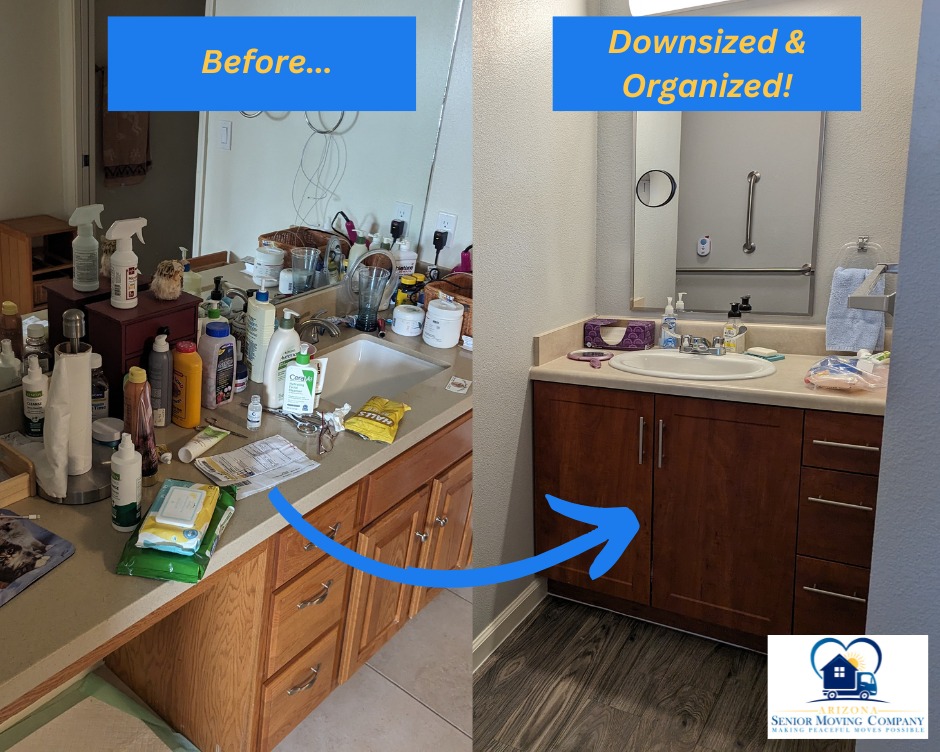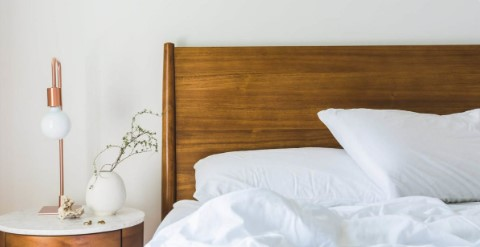
The Family Feud Sparked by Downsizing: How to Mediate Conflicts
Downsizing a family home is never just about boxes and furniture—it’s about memories, relationships, and trust. At Arizona Senior Moving, we exclusively serve seniors and their families, and we’ve seen how quickly well-intentioned efforts can turn into family feuds when forced purges take over. Here’s why conflicts erupt, what doesn’t work, and how a compassionate, third-party approach can protect both your relationships and your peace of mind.
The Problem: Clearing Homes Without Consent Damages Trust
When adult children or relatives clear out a senior’s home without their involvement, it can feel like a betrayal. Every keepsake, photo, or piece of furniture may hold a story or memory. Removing these items without consent can leave seniors feeling powerless, hurt, and disconnected from their own lives. Trust is fragile during these transitions, and once it’s broken, it’s challenging to rebuild.
“I came home and half my things were gone. It felt like I didn’t matter anymore.”
The Failed Approach: Ultimatums and Rushed Decisions
Statements like, “We’re donating this tomorrow,” or “If you don’t decide now, it’s going,” only escalate tension. Ultimatums create resentment and often lead to heated arguments, lingering guilt, or even estrangement. What’s meant to be a helpful gesture can quickly become a source of lasting conflict.
“We thought we were helping, but it just made Mom shut down.”
“My siblings and I barely speak now after the way we handled Dad’s move.”
The Solution: Use Third-Party Professionals for Collaborative Decision-Making
A neutral, compassionate third-party—like a senior move manager or senior exclusive mover—can transform the downsizing process. These professionals:
Facilitate open, respectful conversations where everyone feels heard.
Help families prioritize what matters most, both emotionally and practically.
Guide sorting and decision-making at a pace that honors the senior’s wishes.
Reduce tension, prevent misunderstandings, and keep the focus on preserving family harmony.
Working with a mediator isn’t about giving up control—it’s about making sure everyone’s voice is valued and the process is as gentle as possible.
You Don’t Have to Navigate This Alone
At Arizona Senior Moving, we exclusively serve seniors and their families with empathy, patience, and a collaborative spirit. Whether you need help sorting belongings or making tough decisions, our team is here to keep your family’s trust—and your memories—intact.
Internal Linking Sentence for SEO:
For more support, see our Downsizing & Sorting Assistance, learn about Senior Move Services, or explore our Senior Moving Tips & Resources for more ways to keep your move peaceful and family-focused.

Why Letting Go of a Family Home Feels Like Losing Part of Yourself
Leaving a family home or a home you’ve lived in for several years is never just about packing boxes. For many seniors and their families, it feels like leaving behind a piece of themselves-a lifetime of memories, traditions, and identity woven into every room. At Arizona Senior Moving, we understand that moving is an emotional journey, not just a logistical one. Here’s why this transition feels so overwhelming, and how you can honor your memories while making space for what’s next.
The Problem: Sentimental Attachments Run Deep
A home is more than four walls-it’s the backdrop for birthdays, holidays, gatherings, and quiet moments that define a family’s story. Every item, from children’s artwork to wedding china, holds a memory and a piece of your identity. For seniors, these belongings are tangible reminders of a life well-lived. Sorting through them can stir up grief, nostalgia, and even anxiety about losing part of who you are.
“It’s not just stuff. It’s my story, my family, my life. How do I just walk away from that?”
The Failed Approach: Rushed Purges Lead to Regret and Conflict
In the rush to meet deadlines or clear out a home quickly, families sometimes make snap decisions-tossing out or donating items without enough thought. This can lead to deep regret, family disagreements, and a lingering sense of loss. The emotional fallout from a rushed purge can last long after the move is over.
“We got rid of things I wish we’d kept. Now, every time I think about them, I feel a pang of regret.”
“My siblings and I argued over what to keep and what to let go. It made a hard time even harder.”
The Solution: Preserve Emotional Value Without Clutter
Letting go doesn’t have to mean losing everything. There are gentle, meaningful ways to honor your memories and keep your sense of self intact:
Memory Photography: Take photos of meaningful rooms, favorite nooks, and cherished objects. Create a digital or printed album to revisit whenever you wish.
“Keep Boxes”: Designate a small box for each family member to fill with their most treasured items-letters, trinkets, or a piece of childhood art. This keeps the most precious memories close without overwhelming your new space.
Memory Walls: In your new home, display a collage of photos, mementos, or a framed recipe from the old house. This brings comfort and familiarity to your new space while honoring your past.
Story Sharing: Take time to tell the stories behind your keepsakes. Record them in a journal or on video so your family can cherish them for generations.
Remember: Your memories live in your heart, not just in your belongings. Moving forward doesn’t erase your history-it creates space for new memories to blossom.
You Don’t Have to Do This Alone
At Arizona Senior Moving, we exclusively serve seniors and their families. We know how overwhelming this journey can feel, and we’re here to help you sort, pack, and preserve what matters most-with compassion, patience, and respect.
Our Downsizing & Sorting Assistance: For step-by-step support on making decisions about what to keep, donate, or let go.
Estate Clearing Services: If you need help preparing a home for sale after a move.
Packing, Unpacking & Settling In: See how we help you create a warm, familiar space in your new home.
Senior Moving Tips & Resources: More advice on handling the emotional side of moving.
Testimonials: Read stories from families who’ve made the transition with us.

5 Essential Downsizing Tips for Seniors Moving to a Smaller Home
Moving to a smaller home can feel overwhelming, but with the right plan, seniors can downsize smoothly and stress-free. Here are five expert tips to help make the transition easier.
1. Start Early & Take Your Time
Begin sorting through your belongings at least 3-6 months before your move to avoid last-minute stress.
2. Prioritize Sentimental & Essential Items
Keep cherished memories and functional items that will fit your new space. Consider donating or gifting other belongings to loved ones.
3. Measure Your New Space
Make sure your favorite furniture and decor fit comfortably in your new home before moving.
4. Seek Professional Help
Companies like Arizona Senior Moving Company specialize in helping seniors downsize with care and efficiency.
5. Embrace the Next Chapter
Downsizing is an opportunity to enjoy a simpler lifestyle with less clutter and more freedom.
Need expert downsizing help? Arizona Senior Moving Company is here to make your transition stress-free. Call us today for a free consultation! 602-620-9941

Senior Downsizing Myths Debunked – The Truth About Simplifying Your Life for Seniors
Senior downsizing can feel like an intimidating task, especially for seniors transitioning to a smaller space or a senior living community. Misconceptions about what it means to downsize often lead to unnecessary stress and hesitation. But the truth is, senior downsizing isn’t about loss—it’s about gaining a simpler, more manageable lifestyle. In this post, we’ll debunk common senior downsizing myths and show you how to embrace the process with confidence.
Myth #1: Senior Downsizing Means Losing Everything You Love
One of the biggest fears about senior downsizing is parting with sentimental items. However, downsizing isn’t about giving up everything you love; it’s about focusing on the things that truly matter.
The Reality: Senior downsizing allows you to prioritize cherished belongings. Whether it’s a family photo album or a favorite piece of furniture, the goal is to create a home filled with meaningful items.
Pro Tip: Use creative solutions like shadow boxes or digital photo frames to preserve and display memories in smaller senior-friendly spaces.
Myth #2: Senior Downsizing is Only for Financial Reasons
Many seniors believe downsizing is solely about saving money, but the benefits extend far beyond finances.
Reality: Senior downsizing can improve quality of life by reducing home maintenance, increasing safety, and offering opportunities to live closer to loved ones or in a more supportive senior community.
Pro Tip: Look at senior downsizing as an investment in peace of mind and a simpler lifestyle, rather than just a financial decision.
Myth #3: Senior Downsizing is Too Overwhelming to Handle
It’s natural to feel overwhelmed when facing years of accumulated belongings, but you don’t have to do it alone.
The Reality: Breaking the senior downsizing process into manageable steps and seeking professional help can make it smooth and stress-free.
Pro Tip: Senior moving specialists, like Arizona Senior Moving Company, can guide you through each step, from sorting items to settling into your new senior-friendly home.
Myth #4: Family Will Take Care of Everything
While family support is valuable, relying solely on loved ones can be challenging for both parties.
The Reality: Families often have busy schedules and may not have the expertise to handle a senior move efficiently.
Pro Tip: Hiring senior moving professionals ensures that the process is handled with care and attention, relieving both you and your family of unnecessary stress.
Myth #5: Moving to a Smaller Senior Home Means Sacrificing Comfort
Senior downsizing doesn’t mean you’ll lose the comfort of your current home—it just means reimagining it on a smaller scale.
The Reality: A thoughtfully planned senior-friendly space can be just as cozy and functional as a larger one. With the right furniture and organization, small spaces can feel open and inviting.
Pro Tip: Consider multipurpose furniture, like ottomans with storage or foldable tables, to maximize space while maintaining comfort.
Senior downsizing isn’t about sacrifice—it’s about making intentional choices that lead to a more manageable and fulfilling lifestyle. By letting go of misconceptions and seeking the right support, you can transform senior downsizing into an exciting new chapter. If you’re ready to embrace the benefits of senior downsizing, Arizona Senior Moving Company is here to help. Contact us today for compassionate, expert assistance that takes the stress out of moving.

How Clean Is Your Bed
We wash our sheets on a regular basis, but what about keeping the rest of our bed clean? Here are some tips for cleaning your bed to help you have a healthy night’s sleep!
Dusting
It’s easy to overlook this step when you’re cleaning your bed, but it’s important to dust your bedframe about once a month. When you see particles floating in the air on a sunny day, most of them are dead skin cells. Especially if you have allergies, you don’t want your bedframe covered with dust . This could have you coughing and sneezing constantly. Make sure you dust in a direction that brushes the dust outward and away from sheets, pillows, and blankets. (Of course, vacuum the floor after brushing dust onto it.) It’s a good idea to take this step before cleaning the rest of your bed so that if any dust does end up on the bed, you’ll end up removing it when you clean your sheets and mattress.
Caring for your mattress

Take the time to clean your mattress about every six months. You should start by vacuuming the mattress. Then, sprinkle it with baking soda, rub that in with a scrub brush, and let everything sit for ten minutes. Next, you should vacuum your mattress again and remove any stains using these DIY stain removal mixtures. Then, if possible, and if your mattress doesn’t have a pillow top, flip the mattress over and repeat these steps. Even if you don’t notice obvious stains on your mattress, mattresses build up sweat over time. You should also rotate your mattress every three months to a year, unless you have a Tempur-Pedic or Sleep Number mattress.
Washing sheets and pillowcases
Every night, you rest your body on your sheets and lay your head down on your pillow. You probably don’t think about the last time you cleaned your sheets or pillowcase because they don’t appear dirty. At the same time, you wouldn’t wear your clothes for weeks or months on end, but many of us sleep in our beds night after night without cleaning our sheets. Although your bed might look clean, it actually builds up oil and sweat each time you sleep in it. This could contribute to skin issues like acne. For optimal cleanliness, you’ll want to change or wash your sheets once a week or once every two weeks with hot or warm water.
Cleaning blankets and pillows

Check the tags on your comforter and pillows for care instructions that explain how to clean these items. Typically, you can throw both into your washing machine at home using cold water and dry them on low heat. You should wash all the pillows and blankets on your bed at least twice a year. This will protect against dust mites. If you’re feeling sick and spending a lot of time in your bed, make sure to wash everything on the bed once you feel better to remove lingering germs.
Protecting against bleach
Many acne medications contain benzoyl peroxide, which reduces redness of zits because it acts as a bleaching agent. When you wear these products on your face or body during the night, you can stain your sheets, pillowcases, and blankets with bleach. This leaves everything looking discolored and splotchy. You can either opt for white sheets or purchase benzoyl-peroxide resistant sheets, which won’t discolor even if you use bleaching acne medication or other products. You’re free to purchase colorful sheets without staining your pillowcase.
If you’re sleeping eight hours a night, you’re spending about one third of your life in your bed. It’s worth it to spend a little time making sure this is a clean, healthy space for you to spend such a large portion of your time.
